Whether you're an aspiring auditor looking for your first job or a seasoned professional in the field, having a standout auditor resume is essential to capture the attention of recruiters.
Crafting an effective resume is a lot like conducting an audit itself — it requires precision, organization, and attention to detail. Lucky for you, our handy tips, real-world examples, and compelling templates will equip you with the strategies to craft an auditor resume that sets you apart from the competition and highlights your skills effectively.
Read on and learn how to:
- Explore valuable auditor resume examples
- Choose the best format for your auditor resume
- Craft an attention-grabbing resume summary or objective
- Select the best auditor hard and soft skills
- Tailor your auditor work experience section to a specific role
- Include powerful action verbs in your resume
- Make your auditor resume shine with a strong education section
- Include relevant extra sections in your auditor resume
- Avoid common mistakes in an auditor resume
- Pair your resume with a relevant cover letter
- Learn about the average salary and job outlook for auditors
- Find top resources for job-seeking auditors
Junior auditor resume example
Why does this resume example work?
- Strong professional accomplishments: This resume highlights commendable achievements, such as a 25% reduction in company expenses within a year and being recognized as Employee of the Month. These accomplishments demonstrate the candidate's capability and value to any potential employer.
- Well-rounded skill set: The resume showcases a broad range of skills, including strong analytical abilities, proficiency in various audit software programs, and multilingual capabilities. This diverse skill set makes the candidate versatile and adaptable to various tasks and environments.
What could be improved?
- Detailed job descriptions: While the responsibilities listed under work experience are clear, adding more specific examples of contributions and the impact of the candidate's work can provide deeper insights. For example, instead of "Supported multiple senior auditors with risk management and various duties," it could detail a particular project or outcome.
Financial auditor resume sample
Why does this resume example work?
- Relevant experience and achievements: The resume highlights the candidate's three years of comprehensive experience as a Financial Auditor, including being recognized as Employee of the Year. Additionally, it notes specific achievements such as developing and implementing new audit programs that improved efficiency by 10%.
- Strong educational background: The candidate's educational achievements are impressive, including First Class Honours in Economics & Finance and ranking in the top 3% of their program. This academic excellence adds significant value to the candidate's profile.
What could be improved?
- Expand on professional achievements: While the resume mentions some achievements, it would benefit from more quantifiable accomplishments. For instance, detailing specific financial savings, the number of audits completed, or the impact of audit findings on the company’s financial performance would add depth.
- Soft skills examples: While the resume lists several strengths, providing specific examples or contexts where these skills were demonstrated would strengthen the profile. For instance, “Leadership” can be illustrated with instances of leading a team or project.
Inventory auditor resume example
Why does this resume example work?
- Clear professional profile: The profile section provides a concise overview of the candidate's strengths, such as being proactive, results-oriented, and possessing exceptional analytical and time management skills, which make for a strong first impression.
- Quantifiable achievements: The candidate highlights a tangible accomplishment, such as a 27% efficiency increase within one year. This quantifiable achievement demonstrates the significant impact of their work and adds credibility to the resume.
What could be improved?
- Highlight additional achievements: The candidate could further strengthen their resume by including more specific accomplishments. Adding details such as cost savings, error reductions, or improvements in audit accuracy would provide more depth.
- Expanded job descriptions: While the job responsibilities are outlined, the resume would benefit from more detailed descriptions of the candidate's contributions and the outcomes. For example, specifying the types of inventory audits conducted and their frequency could offer more insight.
1. How to choose the best format for your auditor resume
Creating a well-formatted resume is crucial for making a strong impression as an auditor. The right layout not only highlights your qualifications but also enhances readability. There are three main types of resume formats to consider: chronological, functional, and combination. Each has its advantages and is suited for different types of job seekers.
1. Chronological resume: A chronological resume is the most traditional and widely used format. It lists your work history in reverse chronological order, starting with your most recent job and working backward. Its key features are:
- Structured timeline: Emphasizes your consistent employment history and career progression.
- Work experience first: Your job titles, companies, and dates of employment are listed prominently.
- Ideal for: Professionals with a strong and uninterrupted career history.
This format is perfect if you have extensive experience in auditing and want to showcase a steady career path. It's easy to follow and is preferred by recruiters who want to quickly see your job history.
2. Functional resume: A functional resume focuses on your skills and qualifications rather than your chronological work history. This format is designed to highlight your abilities and accomplishments. Its key features are:
- Skills-based: Groups your experience by skill areas or projects rather than by specific jobs.
- Less emphasis on dates: De-emphasizes employment dates, which can be advantageous for those with gaps in their work history.
- Ideal for: Career changers, recent graduates, and those with diverse experience in auditing.
If you're transitioning into auditing from another field or have gaps in your employment history, a functional resume allows you to showcase your relevant skills and achievements without focusing on a linear job progression.
3. Combination (hybrid) resume: The combination resume is a hybrid of the chronological and functional formats. It prioritizes both your skills and your work history, making it a versatile option. Its features are these:
- Balanced focus: Begins with a summary of qualifications followed by detailed work history.
- Highlights skills and experience: Allows you to display your skills prominently while also providing a structured timeline of your job history.
- Ideal for: Experienced auditors who want to highlight their key skills as well as their career progression.
This format is perfect if you have a solid background in auditing and want to highlight specific skills and achievements while maintaining a clear employment timeline.
All in all, choosing the right resume format can impact how effectively your qualifications are communicated to potential employers. Whether you opt for a chronological, functional, or combination resume, ensure that your structure aligns with your career stage and professional history.
2. Craft a compelling resume summary or objective
Crafting a compelling resume summary or objective as an auditor depends on your years of experience in the field. If you've accumulated over two years of experience, a resume summary is your go-to. If not, opt for a resume objective.
Despite their slight differences, both serve the same purpose — providing a quick yet impactful snapshot of your qualifications to hiring managers.
To make your auditor resume summary a standout, focus on quantifiable achievements from the get-go. Highlight your auditing accomplishments related to cost savings, performance enhancements, or any positive metrics you can back up with figures.
Bad example of an auditor resume summary
Auditor with experience in financial assessments and audits. Good at identifying issues and working with teams. Looking for a challenging role to improve my skills.
Why is it so bad? This summary is too vague and lacks specificity. It doesn’t provide quantifiable achievements or highlight the candidate’s impact on previous roles. To stand out, the summary needs concrete examples and metrics that showcase the auditor’s abilities and successes. Something like the example below:
Good example of an auditor resume summary
Experienced auditor with over 7 years of experience in conducting financial assessments and audits. Successfully led and completed more than 50 audits, resulting in improved internal controls and significant cost savings for clients. Proficient in identifying and resolving discrepancies, reducing financial risks by 20%. Skilled in analyzing financial statements and identifying opportunities for process optimization, leading to a 15% increase in efficiency.
Why does this summary work? It's comprehensive and impactful, providing clear and quantifiable achievements. It emphasizes the candidate’s extensive experience, specific accomplishments, and the positive outcomes of their work. This level of detail and specificity makes a strong impression on hiring managers, demonstrating the candidate's capability and effectiveness.
For a resume objective, place the spotlight on your qualifications and express your career goals.
Don't hesitate to showcase achievements outside the corporate world, such as voluntary work or freelance contracts, especially if your professional history is relatively short. These experiences can still hold substantial value in demonstrating your capabilities and commitment.
Bad example of an auditor resume objective
Looking for a junior auditor position to start my career. Have some experience in auditing and willing to learn more. Excited to work in a professional environment.
Why wouldn't it charm a hiring manager? This objective is generic and lacks concrete details. It doesn’t clearly outline the candidate’s qualifications or specific career goals. Simply stating a desire to start a career without presenting relevant skills or experiences makes this objective weak and unpersuasive.
Good example of an auditor resume objective
Detail-oriented and motivated auditor with a solid foundation in accounting principles, gained through academic coursework and hands-on experience in voluntary audit projects for local nonprofits. Eager to leverage my financial acumen and commitment to accuracy in the role of Junior Auditor at [Company Name]. Dedicated to supporting financial transparency and integrity while continuously expanding my auditing skills in a professional setting.
Why does it hit the mark? This objective is clear and focused, highlighting specific qualifications and relevant experiences. By mentioning academic coursework and voluntary audit projects, the candidate effectively demonstrates their foundational skills and commitment. The objective aligns the candidate’s career aspirations with the potential value they can bring to the role, making it compelling and professional.
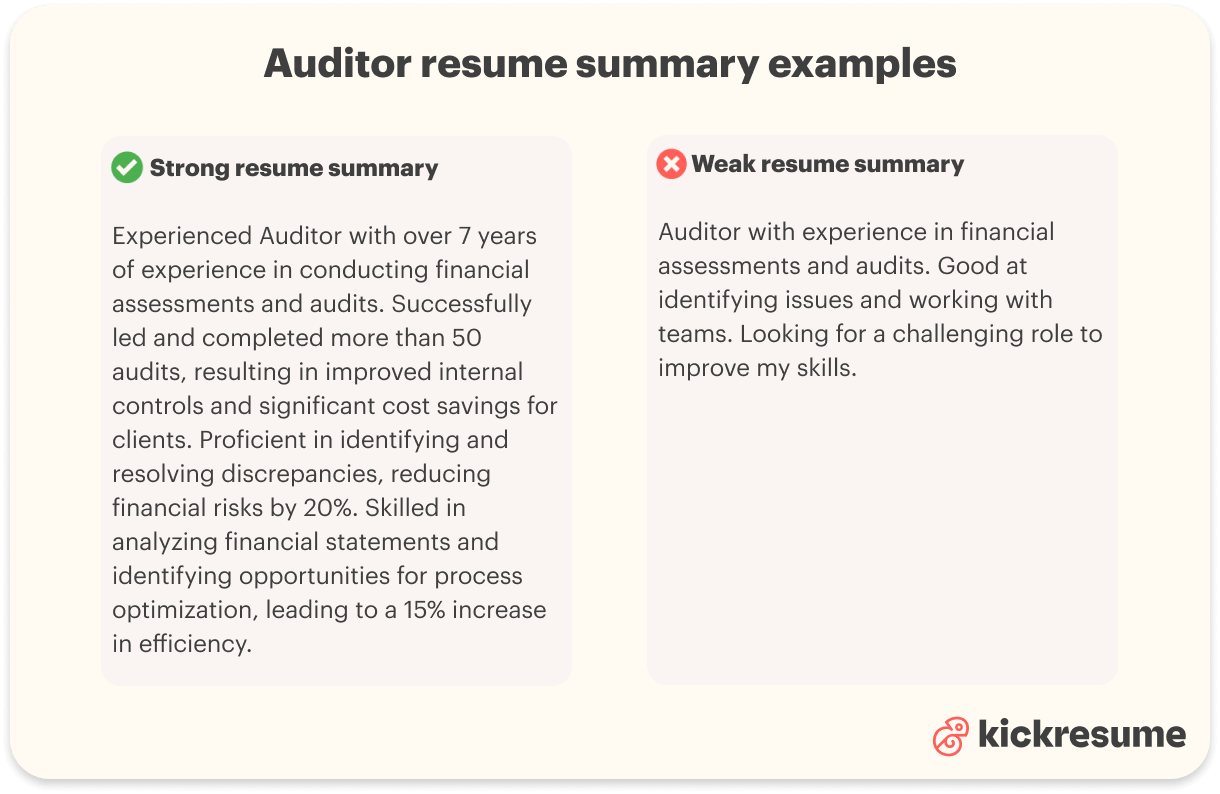
3. How to choose the most relevant auditor skills for your resume
Including both hard and soft skills on an auditor resume is crucial for showcasing your qualifications and abilities in the field.
Hard skills demonstrate your technical expertise and proficiency in performing specific tasks related to auditing. They essentially validate your competence in areas such as financial analysis, data auditing, risk assessment, and regulatory compliance. What’s more, they are tangible and measurable
On the other hand, soft skills play a significant role in your effectiveness as an auditor. These skills include communication, attention to detail, critical thinking, problem-solving, and collaboration.
The best hard skills for your auditor resume
- Financial analysis
- Generally Accepted Auditing Standards (GAAS)
- Generally Accepted Accounting Principles (GAAP)
- Taxes
- Asset management
- Payroll
- Compliance
- Collections
Effective soft skills to put on your auditor resume
- Communication (verbal and written)
- Attention to detail
- Critical thinking
- Problem-solving
- Analytical skills
- Time management
These are the kinds of skills that most employers hope their candidates have, so you might as well put their minds at ease and fill them with confidence by acknowledging that you have them from the outset!
Remember, tailoring your skills section to match the specific requirements of the auditing job you're applying for can significantly increase your chances of success.
4. How to tailor your auditor work experience section to a specific role
If you want to succeed in finding a new role as quickly as possible, break free from the notion that your resume is a static, unchanging document.
Auditing jobs aren't challenging to come by — they've been on a growth trajectory for many years, and with more companies, money, and data around than ever before, that's unlikely to slow down. However, you shouldn't assume that a considerable number of roles means you could walk into a job at any moment.
The best way of all to stand out is to ensure your resume works for the job you want.
You have the job description, but that alone isn't enough, especially if you're aiming for larger companies. Take the extra steps to explore their website, follow their social media, learn about their values and what drives them as a company.
Once you have a deep understanding of the company, it's time to evaluate how your unique auditing skills and expertise can directly contribute to their success in the specific role you're applying for.
Skillfully weave these contributions into your work experience section, strategically including keywords from the job description to highlight your perfect fit for the position.
Let's take a look at two contrasting examples:
Bad example of an auditor work experience entry
LRM International, LLC, Brussels, Belgium
Senior Auditor
2015-2020
- Performed audits for various clients.
- Reviewed financial documents and reported discrepancies.
- Worked with team members on audit projects.
- Communicated findings to clients.
Why is it ineffective? This work experience entry is too vague and lacks specific details. It doesn't quantify achievements or demonstrate the unique value the auditor brought to the company. Additionally, it doesn’t include any customized keywords from the job description, which can make it less appealing to recruiters.
Good example of an auditor work experience entry
LRM International, LLC, Brussels, Belgium
Senior Auditor
2015-2020
- Conducted financial audits for high-profile clients, including Fortune 500 companies, ensuring compliance with GAAP and industry regulations.
- Lead a team of three junior auditors, providing guidance, training, and overseeing their audit processes.
- Identified and communicated audit findings and recommendations to clients, resulting in process improvements that saved clients an average of $500,000 annually.
- Developed and implemented data analytics tools, reducing audit time by 20% and increasing accuracy.
- Collaborated with cross-functional teams, including legal and compliance, to address regulatory concerns and maintain transparency.
Why is this a good example? It simply highlights specific achievements and responsibilities, uses quantified results, and includes relevant keywords. Each bullet point demonstrates the candidate’s direct impact on the company's success.
Remember, tailoring your resume to each specific role is crucial in a competitive job market. By customizing your work experience section to align with the company’s needs and using specific keywords, you can significantly increase your chances of landing that job. Always remember, your resume should evolve with each application to highlight how you are the perfect fit for that particular role.
5. How to use powerful action verbs in your resume
Using powerful action words in your auditor resume is crucial for making your experiences and accomplishments stand out. Action words, also known as action verbs, convey confidence and clarity about your capabilities and achievements.
Why are action words crucial?
- Enhance readability: Action words make your resume more dynamic and compelling. They help break the monotony of passive descriptions and make your achievements and responsibilities jump off the page.
- Showcase accomplishments: Action verbs emphasize the actions you took to achieve specific results, highlighting your initiative and effectiveness in meeting goals and solving problems.
- Impress employers: Recruiters and hiring managers are often looking for candidates who can demonstrate their value through concrete examples. Action words help convey a sense of urgency and productivity, making you appear as a proactive and results-driven professional.
- Pass ATS: Many companies use Applicant Tracking Systems (ATS) to screen resumes. Using strong action verbs that align with job descriptions can improve the chances of your resume passing through these automated systems.
List of powerful action words for an auditor resume
- Analyzed
- Assessed
- Audited
- Calculated
- Compiled
- Conducted
- Controlled
- Coordinated
- Detected
- Developed
By integrating these action words into your auditor resume, you can more effectively convey your professional strengths. Remember to match these words with quantifiable achievements and specific examples to create a powerful and impressive resume.

6. How to make your auditor resume education section stand out
An education section plays a significant role in your auditor resume, showing your readiness for the job.
Whether you hold a bachelor's degree, master's degree, or certifications like a CPA, your educational background highlights your qualifications and lends credibility to your financial analysis and auditing skills.
What’s more, many job listings specify certain educational requirements, so including your academic achievements ensures you meet these criteria.
If you possess specialized knowledge, such as expertise in forensic accounting or IT auditing, it's an added advantage. Even if you're just starting your career, your educational accomplishments indicate your eagerness to learn.
Here’s an example of a well-structured education section for your auditor resume
Bachelor of Science in Accounting
- XYZ University
- Graduated in May 2017
- Notable Achievement: Awarded First Place in University-Wide Financial Analysis Competition
Certified Public Accountant (CPA)
- Certification obtained from [Certification Body]
Additional Expertise
- Auditing Principles, Financial Analysis, Forensic Accounting
Yes, your education section is more than just a list of degrees and certifications — it's a showcase of your qualifications and dedication to the field of auditing. By highlighting relevant coursework, certifications, and notable achievements, you can make this section a powerful part of your resume. Tailoring it to match the job description can further boost your chances of landing the role you're aiming for.\
Pro tip: If your educational background is in an unrelated field, highlight any relevant coursework, certifications, or projects that showcase your auditing and financial analysis skills. This will help bridge the gap and demonstrate your readiness for an auditing role.
7. Include relevant extra sections in your auditor resume
It's standard practice to keep a resume short and sweet. Ideally, it won't be any longer than a single page. However, if you've got space to spare or something you really want the hiring manager to know about, don't be shy about going above and beyond.
This is particularly pertinent in the auditing world, as most resumes can end up looking similar. That's not to say that auditors come off a production line, but their qualifications, education, and experience can often follow similar trajectories.
You can overcome this by considering relevant skills that might not be commonplace among the professional auditing community, including:
- Additional languages beyond your native one
- Specific projects you've played a role in
- Relevant interests outside the workplace
- Volunteering activities
Here's an example of how to list an extra section in an auditor resume
Volunteering activities
Volunteer Auditor, XYZ Nonprofit Organization, City, State
- Conducted financial audits for the organization's annual fundraising events, ensuring adherence to financial policies and procedures.
- Collaborated with the finance team to identify areas for improvement in financial controls and provided recommendations for enhanced transparency and accountability.
- Assisted in the preparation of financial statements and reports, contributing to the organization's annual financial review process.
Adding extra sections to your auditor resume can set you apart in a field where many candidates have similar qualifications. Highlighting unique skills, projects, or volunteer experiences can give hiring managers additional reasons to consider you. Don't shy away from showcasing what makes you unique — it could be your edge in landing the job.
8. How to avoid common mistakes in an auditor resume
Crafting a standout auditor resume requires attention to detail, just as the profession itself does. Avoiding common mistakes is crucial to ensure your resume not only passes initial screenings but also impresses hiring managers. Here are some tips to help you sidestep typical errors and create an impeccable resume.
- Spelling and grammar errors: Even minor spelling and grammar mistakes can be detrimental, especially in a field that demands precision. Use tools like spell check, and grammar check, and consider having a peer review your resume to catch any errors you might have missed.
- Poor formatting: A well-formatted resume enhances readability. Avoid cluttered layouts, inconsistent fonts, and excessive use of colors. Stick to a clean, professional design with clearly defined sections and bullet points for easy navigation.
- Lack of quantifiable achievements: Generic job responsibilities don’t convey your impact. Instead, include quantifiable achievements to demonstrate your success. For example, rather than saying "conducted audits," specify "conducted 20+ audits resulting in the identification of $50,000 in cost-saving opportunities."
- Irrelevant information: Avoid including unrelated work experience or personal information. Focus on relevant skills, experiences, and accomplishments that align with the job you’re applying for. Tailor your resume to each job application to highlight the most pertinent qualifications.
- Overemphasis on duties: While it's important to list your responsibilities, overemphasizing job duties without highlighting accomplishments can make your resume blend in with the rest. Balance your resume with duties and the positive outcomes of your efforts.
- Not tailoring your resume: A one-size-fits-all resume won’t capture the attention of hiring managers. Customize your resume for each application by incorporating keywords from the job description and emphasizing relevant skills and experiences.
- Lack of keywords: Many companies use Applicant Tracking Systems (ATS) to screen resumes. Including relevant keywords from the job description can help your resume pass these filters. Use terms like "audit," "financial statements," "compliance," and "internal controls" appropriately.
- Omitting a strong summary or objective: A compelling summary or objective at the top of your resume sets the tone. Avoid generic statements and craft a personalized summary that reflects your qualifications and career aspirations.
- Ignoring soft skills: While technical skills are crucial, don’t forget to mention soft skills such as communication, leadership, and analytical thinking. These skills are vital for working effectively with teams and clients.
By avoiding these common mistakes, you can create an auditor resume that showcases your attention to detail, highlights your achievements, and makes you a compelling candidate for potential employers.
9. How to pair your resume with a relevant cover letter
A cover letter is a crucial complement to your resume, providing a personalized narrative that demonstrates why you are the ideal fit for the position. Always include a cover letter unless the job listing explicitly says not to. It offers an opportunity to address the hiring manager directly and explain your interest in the role and the company.
While both a resume and a cover letter aim to present your qualifications, they do so in different ways. A resume is a structured document listing your work experience, education, skills, and accomplishments, typically in bullet points. A cover letter, conversely, is a narrative document, written in paragraphs, providing context to the information in your resume.
Maintaining a consistent design between your resume and cover letter is crucial. Using the same fonts, color scheme, and formatting style creates a cohesive look, reinforcing your personal brand and demonstrating attention to detail. This unified design enhances the visual appeal of your application, making it easier for hiring managers to read and navigate.
For example, ensure that your cover letter uses the same header as your resume, including your name, contact information, and LinkedIn profile. Match the fonts and font sizes, and maintain a similar layout and margin size for both documents. This consistency signals professionalism and shows that you've put thoughtful effort into your application materials.
In summary, a well-crafted cover letter, paired with a consistently designed resume, creates a polished and compelling job application. This attention to detail not only highlights your qualifications but also showcases your professionalism, making a strong impression on potential employers.
10. Average salary and job outlook for auditors
As of May 2023, the average yearly salary for auditors and accountants was $79,880, according to the most recent data from the U.S. Bureau of Labor Statistics (BLS). This figure reflects the competitive compensation offered to professionals in the field, recognizing the expertise and analytical skills required for these roles.
The employment outlook for auditors is also positive. The BLS projects that employment of accountants and auditors will grow by 4 percent from 2022 to 2032, which is about as fast as the average for all occupations. This steady growth, indeed, highlights the ongoing demand for skilled professionals who can ensure financial accuracy and compliance within organizations.
In addition to growth, the BLS anticipates about 126,500 job openings for accountants and auditors each year over the decade. This robust demand underscores the importance of auditing professionals in maintaining financial integrity and supporting business operations.
All in all, the field of auditing offers a promising career path with a competitive salary and stable job prospects, making it an attractive option for individuals equipped with the necessary skills and qualifications.
11. Top resources for job-seeking auditors
Navigating the job market as an auditor can be complex, but leveraging the right resources can significantly enhance your job-seeking efforts. Here are some valuable tools and platforms to help you land your next role in auditing.
- Job boards and websites: Using job boards such as Indeed, LinkedIn, Glassdoor, and Monster can expand your reach. Indeed offers thousands of auditing positions from various companies and industries. LinkedIn not only lists job openings but also supports professional networking, allowing you to connect with industry peers and follow potential employers. Glassdoor provides comprehensive company reviews and salary information, helping you make well-informed decisions. Monster, on the other hand, offers resume assessments and tailored career advice to boost your job search.
- Professional associations: Joining professional associations like the American Institute of Certified Public Accountants (AICPA) and the Institute of Internal Auditors (IIA) can be immensely beneficial. These organizations often have job boards, networking opportunities, and industry-specific resources that can aid your job search and professional development.
- Networking events and conferences: Attending industry-specific events, webinars, and conferences can open doors to new opportunities. Events hosted by associations such as the AICPA and IIA often include job fairs, networking sessions, and workshops on career advancement. These gatherings are excellent for making valuable connections and staying up-to-date with industry trends.
- Online learning platforms and certifications: Furthering your education with certifications and courses can make you a more competitive candidate. Platforms like Coursera, Udemy, and edX offer courses in auditing, accounting, and related fields. Earning certifications like the Certified Public Accountant (CPA) or Certified Internal Auditor (CIA) can significantly enhance your resume and professional standing.
- Company career pages: Don't overlook the career pages of companies you are interested in. Many firms post job openings directly on their websites before listing them on job boards. Regularly checking these pages can help you find positions early and get a head start on applications.
By leveraging these resources, you can enhance your job search strategy, expand your network, and increase your chances of landing a rewarding position in the auditing field.
Key findings
- In your auditor resume summary, include quantifiable achievements, emphasizing accomplishments like cost savings, performance enhancements, or other positive metrics supported by figures.
- Select both hard and soft skills for your resume, showcasing your technical expertise and personal attributes relevant to auditing.
- Tailor your skills section to align with the specific requirements of the auditing job you're applying for, increasing your chances of success.
- Always ensure that your work experience section is aligned with the job you desire, selecting the right keywords and adding quantifiable achievements.
- Highlight your educational achievements and auditing qualifications prominently in the education section of your resume.
- Consider including extra sections in your resume, such as volunteer work, to demonstrate transferable skills relevant to your potential auditing position.
Still looking for a job? These 100+ resources will tell you everything you need to get hired fast.
Auditor Resume FAQ
How can networking influence my job search as an auditor?
Networking plays a vital role in your job search by helping you build relationships with industry professionals who can provide job leads, references, and insider information about potential job openings. Attending networking events, joining professional associations like the AICPA or IIA, and actively engaging on platforms like LinkedIn can significantly broaden your professional network and uncover hidden job opportunities.
Are there specific job boards that cater to auditing positions more than general job sites?
Yes, there are job boards and platforms dedicated specifically to auditing and accounting positions. Websites like AccountingJobsToday and CareersInAudit offer specialized listings and resources tailored to professionals in the auditing field. These niche job boards can be more effective in finding positions that match your specific skills and career aspirations compared to general job sites.
What are the most valuable certifications for advancing my auditing career?
Certifications like the Certified Public Accountant (CPA) and Certified Internal Auditor (CIA) are highly valuable for advancing your auditing career. These certifications demonstrate your expertise, commitment to the profession, and adherence to industry standards, making you a more attractive candidate to employers. Additionally, specialized certifications such as Certified Information Systems Auditor (CISA) can be beneficial for those focusing on IT auditing.
How can I make my resume stand out for an auditing position?
To make your resume stand out, use powerful action words, quantify your achievements, and tailor your resume to each job application. Highlight specific accomplishments, such as “Led a team to identify $100,000 in cost-saving opportunities” or “Improved internal controls, reducing financial discrepancies by 15%.” Additionally, ensure your resume design is consistent with your cover letter and presents a polished, professional image.
What types of continuing education or skills training are beneficial for auditors?
Continuing education and skills training in areas such as advanced Excel, data analytics, risk management, and cybersecurity are highly beneficial for auditors. Online learning platforms like Coursera, Udemy, and edX offer courses that can help you stay current with industry trends and improve your technical skills. Further, attending workshops and seminars hosted by professional associations can also be incredibly advantageous.

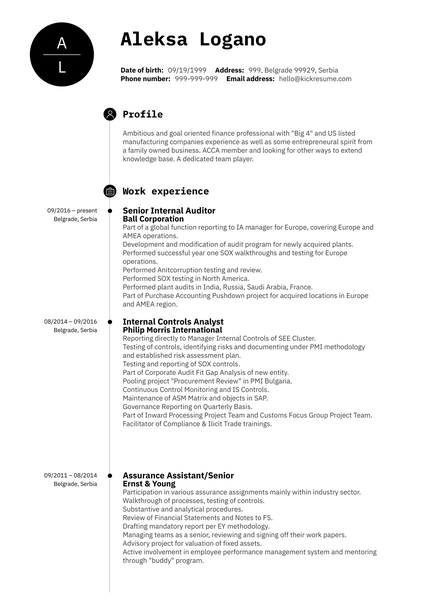

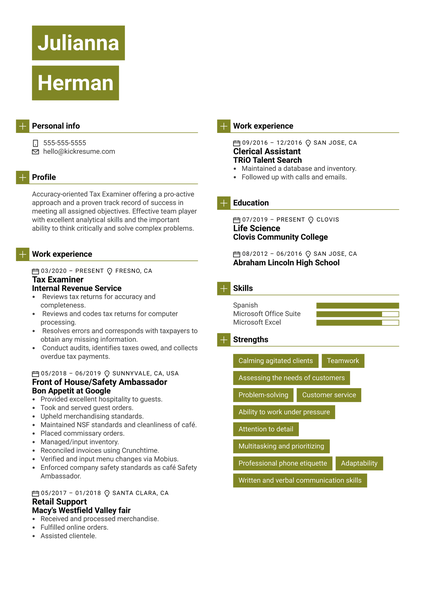

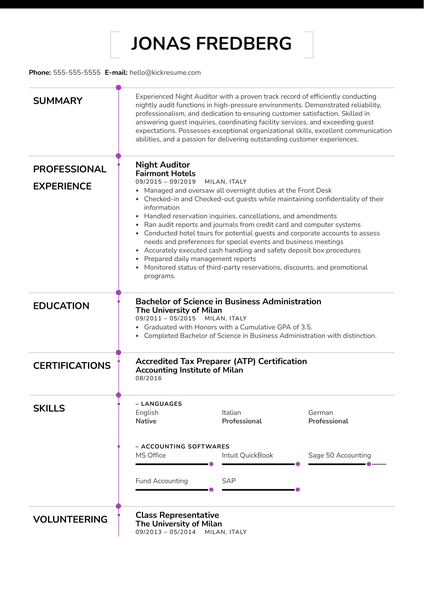



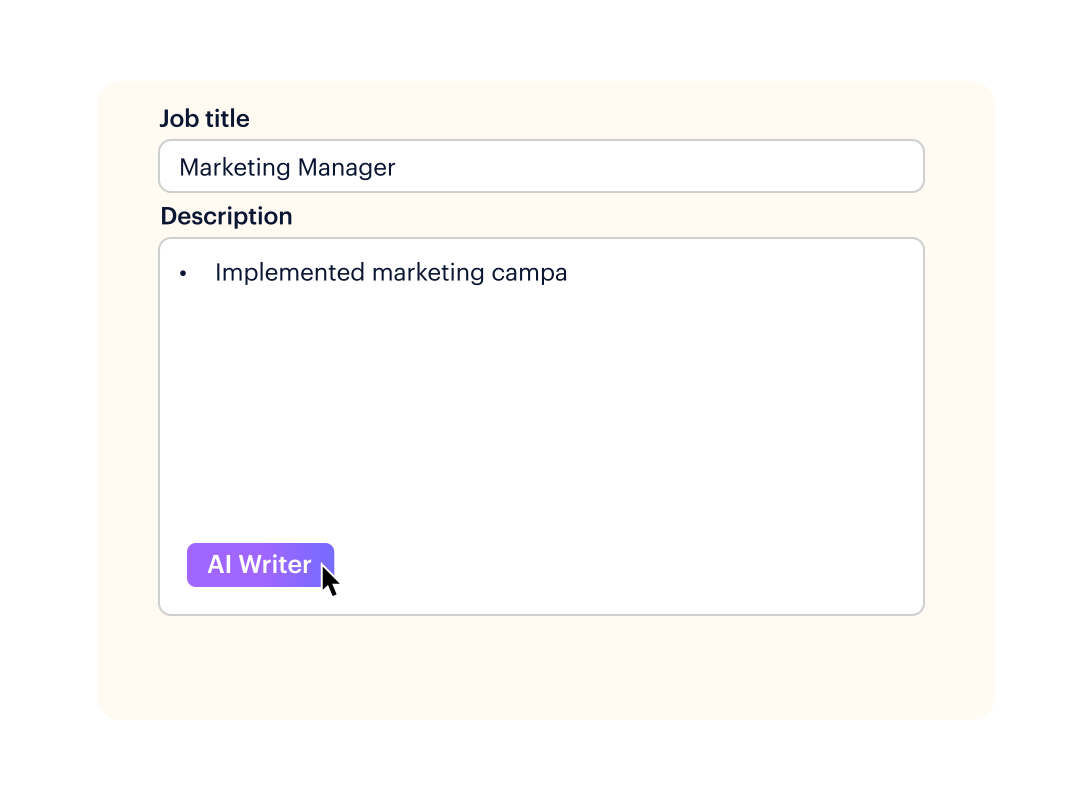


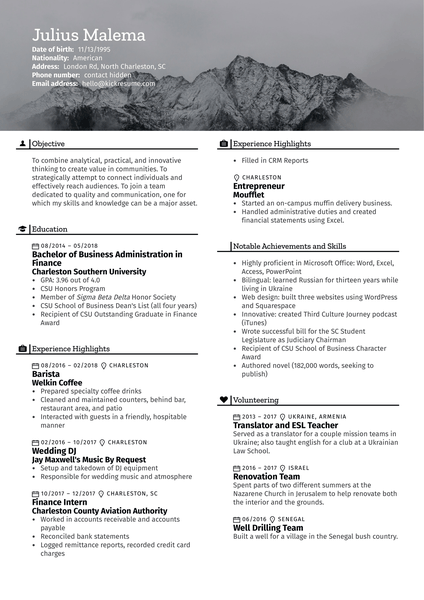
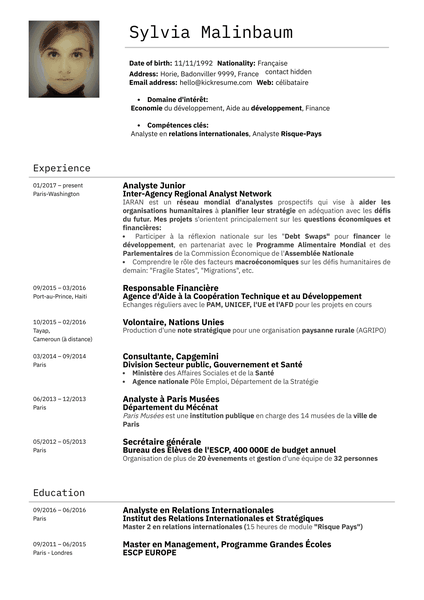

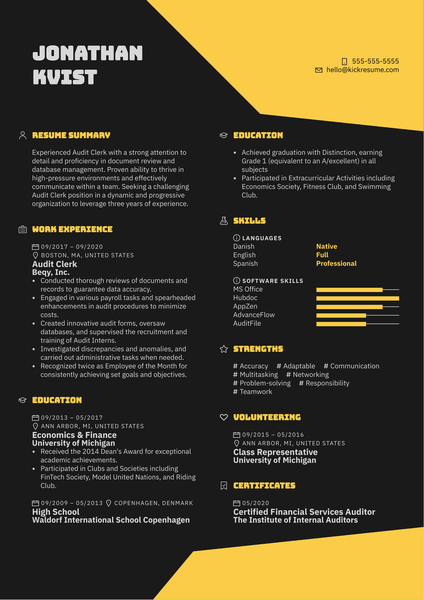
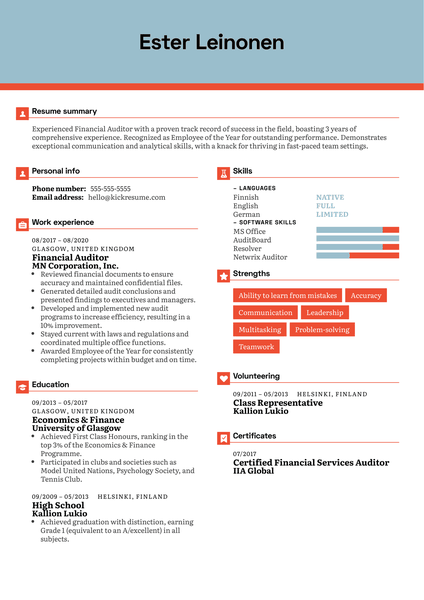
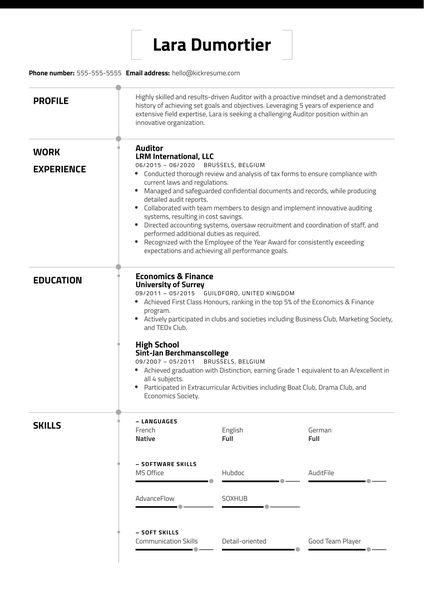
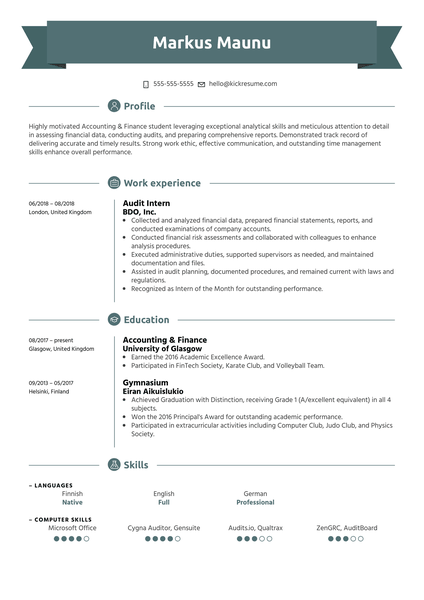



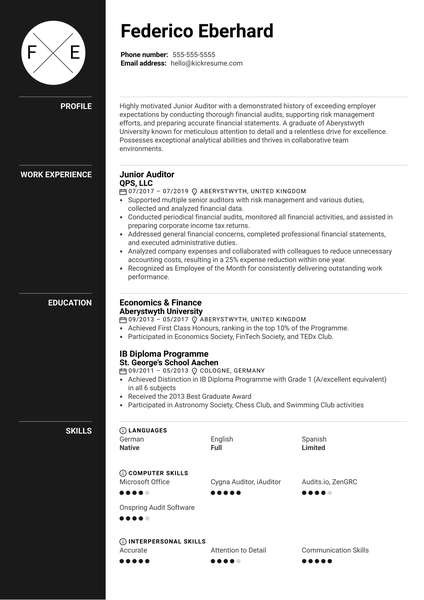
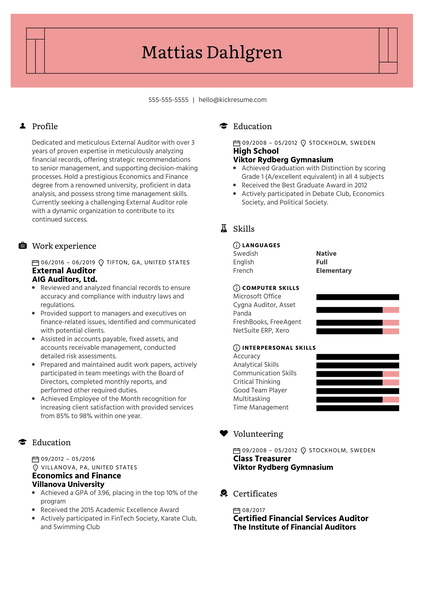

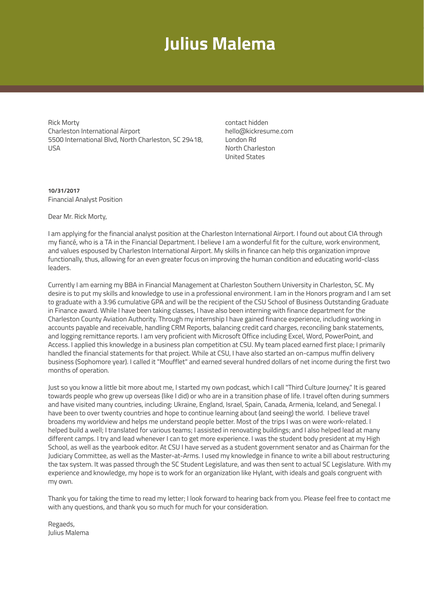
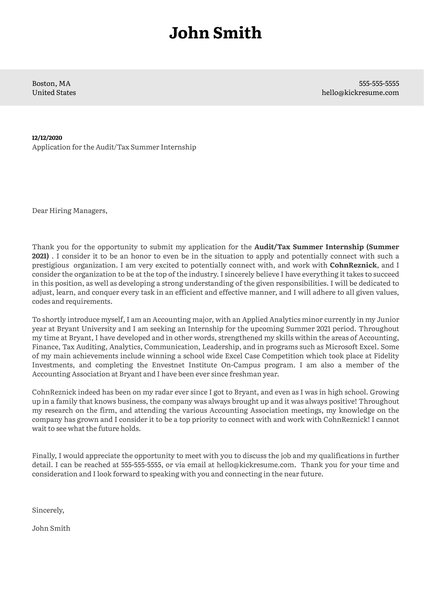
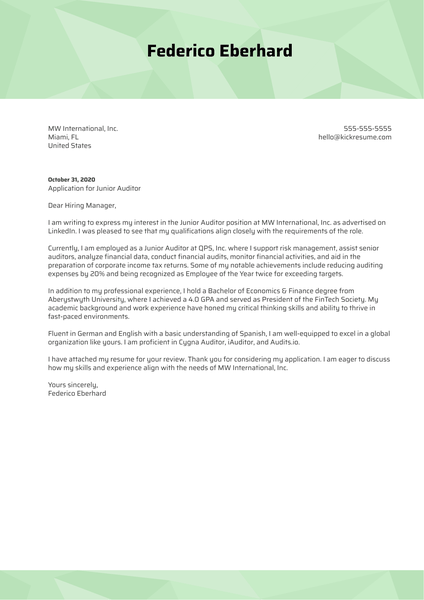



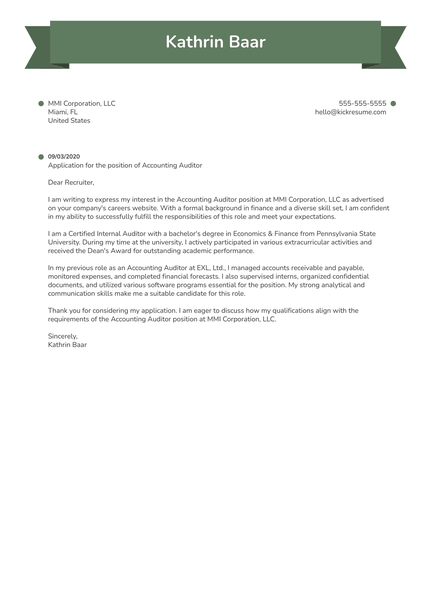
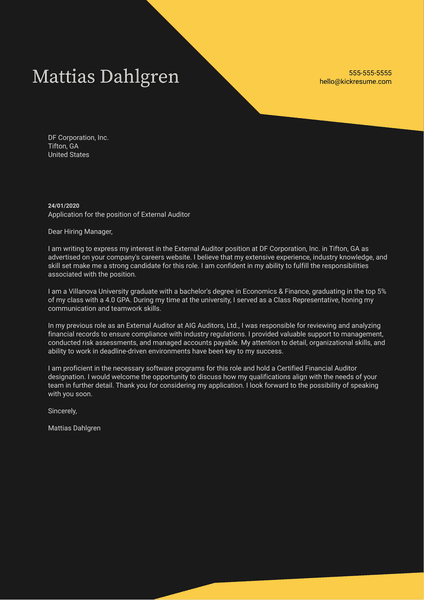
![How to Write a Professional Resume Summary? [+Examples]](https://d2xe0iugdha6pz.cloudfront.net/article-small-images/i-Profile.svg)
![How to Put Your Education on a Resume? [+Examples]](https://d2xe0iugdha6pz.cloudfront.net/article-small-images/i-Collage-Universities.svg)
![How to Describe Your Work Experience on a Resume? [+Examples]](https://d2xe0iugdha6pz.cloudfront.net/article-small-images/Experience.svg)


